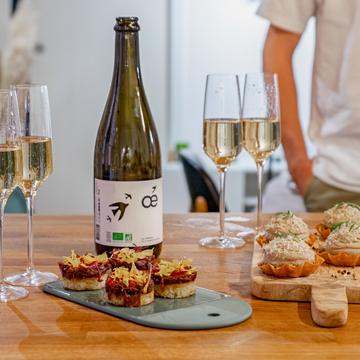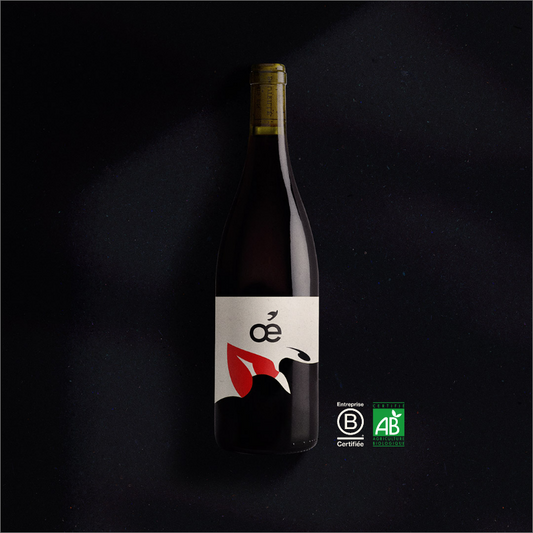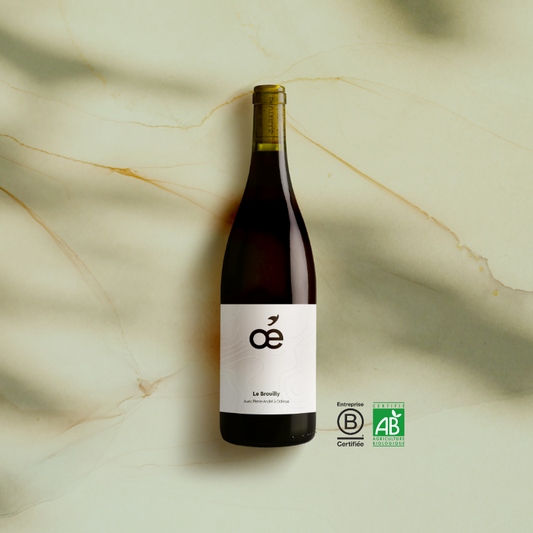Which grape varieties are used in the production of organic wine?
“Don't judge a book by its cover”
We agree, we must not trust appearances. So for wine, we do the same, we take the time to contemplate it and listen to its history to discover the grape varieties that make it up.
What is an organic wine?
Unfortunately, wine does not fall from the sky, unlike the rainwater that runs down the mountains and refreshes our palates after a long walk. Fortunately for us, we have found a way to turn grapes , the fruit of the vine , into wine.
The grape varieties of organic wine: The conception of organic wine
In France, it is customary to drink wine (or rather should we say to taste it). On the other hand, when it comes to knowing how it is produced and all the secrets behind it, there are not many people at the gate. Harvesting , vinification , bottling , etc. There are several ways to make wine.
- You have probably already tasted a conventional wine because today it still represents 90% of the market. Indeed, the production technique is very profitable. The machine replaces the man and the pesticides chemically protect the soil to optimize production. The consequences are not always nice to see, but it works in the short term.
- Wine in sustainable agriculture takes into account both the economic return of conventional wines and the importance of ecology and soil maintenance of organic wines. The winemaker undertakes to have a reasoned viticulture and vinification as its name suggests, well done Sherlock! Sustainable agriculture wines are certified by the "Terra Vitis" label.
- In organic farming, inputs are limited (all inputs must be certified organic), sulphites are also limited (maximum sulphite level at 100mg/l for an organic dry red wine against 150mg/l for a conventional dry red wine) or also the use of certain techniques. Organic is good and that's surely why organic growth should double between 2017 and 2022! At Oé, all our winegrowers are certified organic. If you want to discover them, take a look at our instagram or discover our interviews with them available on our blog.
- Biodynamics or the return to the techniques of yesteryear! This method of production is punctuated by nature, the seasons and the cycles of the moon. Without fertilizers or pesticides, winegrowers who practice biodynamics strongly believe that “ Life does not belong to the Earth but Life is a gift to the Earth ”. The winegrowers therefore use natural products, in particular plants to strengthen the soil. Like us on a movie night, the ground has the right to a little infusion to calm down.
- For natural wine , we push the cork even further Maurice (do you have the reference of the Swiss brown pub? It always makes us laugh so much!). This time, no input is allowed except a very small dose of sulphites, which are naturally present in the grapes. SAINS wines (Without Any Inputs or Sulfites) are the most natural wines you can find. We do not laugh with Saint-Raisin, woe to anyone who modifies the juice. With this technique, we try to get as close as possible to a wine without any human intervention, at the risk of having a wine that goes wrong. Nature has its limits of course, but that's why we love it!
We told you about the sulphite levels above, we invite you to discover the levels practiced by our committed Oé winegrowers

Why drink organic wine?
Why not ? You have four hours…
More seriously (but not too much anyway), drinking organic wine means being in a responsible and eco-citizen approach, and above all loving drinking good wine that perfectly reflects its terroir. Organic winegrowers are committed winegrowers who consider that the land is respected and that our health is important. By limiting inputs, in particular sulphites , and by refusing synthetic treatments and insecticides in the vines , the winegrower demonstrates a desire to change things. The vine today is 4% agriculture and 20% pesticides … The calculations are not good Kevin… we have to change that!
Drinking organic wine is the testimony of a desire to change the world in which we are until the aperitif. Tomorrow will not change on its own and it is the small actions of all of us that will move the lines.
Drinking organic wine is also and above all drinking wine that is as good for your health as it is for the palate. The Oé winegrowers work with love in their vineyards and in their cellars throughout the year to offer you the best of wine . It won't give you a headache the next day and it will especially make you smile when you taste it!
The grape varieties of organic wine: what is a grape variety?
Making organic wine , biodynamic wine and natural wine is more difficult than producing conventional wine because the vines are much more sensitive to climatic and soil conditions. But impossible is not French and the winegrowers who are committed do everything to produce the best organic wines for you with a wide variety of grape varieties .
The grape variety and the vines
If we are not told, it cannot be invented. The grape variety is the variety of vines , a bit like when we talk about the breed of dogs or cats. There are white grape varieties and black grape varieties . While strolling through vineyards or along the roads, you may have already noticed white grapes and black grapes. Also remember grape juice. When we were little, we often had our little preference for one or the other. Lucky that we are, the earth has spoiled us much more than it looks! If we thought we had only the choice between white grapes or black grapes, there are in fact, among these two families, hundreds of different grape varieties .
The soil , weather conditions and surrounding plants have a great impact on the grape variety . The vine soaks up its environment and reflects the aromas that surround it. On a similar terroir , two different grape varieties will have a different rendering, but two similar grape varieties will also have a different rendering if they do not grow on the same terroir . There are therefore an infinite number of possibilities and everyone can find what they are looking for!
The particularities of the grape varieties
The grape varieties are the reflections of the land on which they are grown. They express the terroir ( mineral, limestone, clay, granite, etc.) and give a specific character to the wine. The vine is a plant and it is better adapted to certain climates and certain soils. If you've ever gardened at home, you may have noticed that some fruits and vegetables grow better than others, withstand extreme climates better, and even resist disease.
There are therefore grape varieties that are typical of certain regions but this does not mean that it cannot be found elsewhere:
- Cabernet Sauvignon is the most common grape variety in the Médoc, but it is also grown in the Graves and in other countries around the world (USA, Italy, China, Australia). It is a very resistant variety that is harvested in the last and it also knows how to last over time once in the bottle. This variety offers wines that age very well and which make it possible to obtain good organic red wines with woody aromas and supple tannins .
- Pinot is a grape variety that exists in white, black and even gray (too strong, isn't it?). Pinot Noir is the king of Burgundy and makes it possible to make high quality wines, but it also wins the hearts of Austrians, Italians and Swiss. Pinot Blanc has made Alsace its home to offer us fresh and supple white wines and sparkling wines .
- The Mourvèdre likes to look at the sea so it has woven a love story with the Mediterranean and its sunny climate. It will therefore not surprise you to know that it is also found in Spain but under another name, the “Monastrell”, it has its little effect, doesn't it? ;)
- Sémillon is a white grape variety with which we mainly make great sweet white wines but also very good dry white wines . This grape variety loves the West of France (we understand that, it's magnificent), and we find it in our white Bordeaux and our Côtes-de-Bergerac .
- Syrah has oriental sounds when you pronounce its name and you can also feel it in the glass. This very powerful variety has spicy notes and is very popular in France. It is grown almost everywhere but especially in the Rhône Valley , in Languedoc and in Provence . So don't be surprised to find it in our Languedoc and our Côte-du-Rhône .
- Merlot is THE French grape variety par excellence . It is the most planted grape variety with more than 110,000 hectares, which is approximately 73,000 times the base of the Eiffel Tower. Dizzying, isn't it? But it's for the good cause of wine. He is also a Bordeaux star, sweeter than his comrade Cabernet Sauvignon . Its aromas of black fruits such as Blackcurrant and Blackberry make it an important choice for making good organic red wines but also super good organic rosé wines . Appreciate this variety in our Bordeaux or in our Mediterranean .
- Grenache also appreciates the South and the Mediterranean . It is also part of some great appellations such as the famous Châteauneuf-du-Pape . Winegrowers are very fond of combining Grenache with other grape varieties, but it can also make very good natural wine when it is vinified alone or as a majority grape variety.
- Riesling and Alsace is a beautiful love story. This grape variety is one of the four grape varieties authorized for the AOC Alsace Grand Cru and AOC Alsace appellations . It also expresses itself very well beyond our borders and it is moreover the first grape variety cultivated in Germany. Its fruity and floral aromas are therefore very envious, and it even has a mineral side as it ages.
- Sauvignon blanc produces rather acidic wines with very vegetal and herbaceous notes . It is the Loire Valley that best suits this variety, but it is also found in Burgundy and Bordeaux . He too has a pretty heavy passport because you can find him in the vineyards of Australia, New Zealand, South Africa… you almost want to be a bunch of grapes, don't you?
- Chardonnay is the most famous white grape variety in the world. To make good fruity and flowery organic white wines , this grape variety is a marvel both in the mouth and on the nose . The pale yellow color of our Bugey , a 100% Chardonnay , is as beautiful as this wine is good with its notes of white flowers .
There are many grape varieties to make good organic wine . Their history and characteristics are fascinating. Immerse yourself in the stories and take a look at this article to learn more.
Treat yourself to our organic Provence wines , organic Vaucluse wines , organic Bordeaux wines , organic Languedoc wines , organic Mediterranean wines , organic Côtes du Rhône wines .










